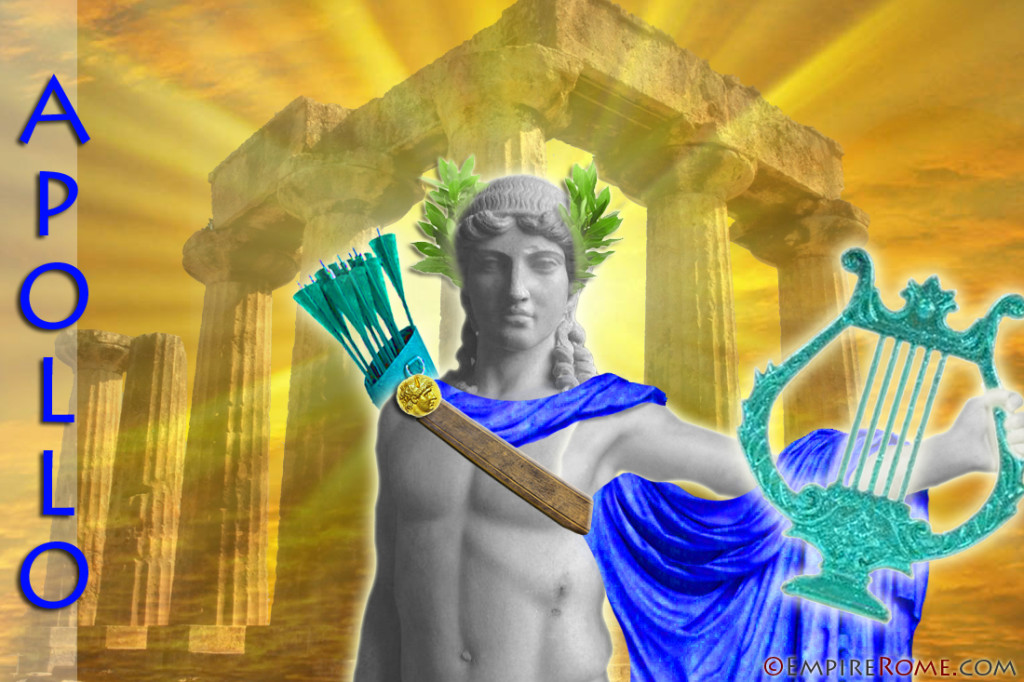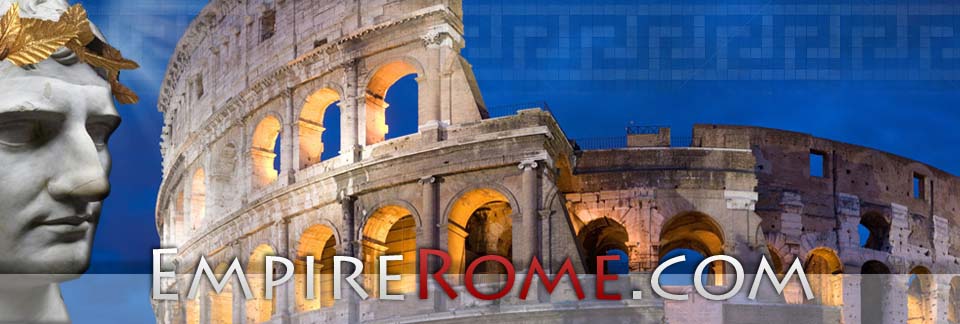
| APOLLO “God of the Sun” | |
| God of: | Sun, hunting, music, healing, medicine, light, prophecy, truth, and archery |
| Type: | Major |
| Roman Name: | Apollo |
| Greek Name: | Apollo |
| Other Names: | Phoebus |
| Festivals: | July 6-13 and September 23 |
| Shrine/Temple: | Temple of Apollo at Delphi |
Overview
According to Ancient Roman religion, Apollo was a very important god especially in Ancient Greek and Ancient Roman societies. The Ancient Romans adopted Apollo from the Ancient Greek god of the same name. The Ancient Romans did not change Apollo’s Greek characteristics as they did with many of the other gods they adopted from different cultures.
Apollo was the son of Jupiter (Zeus) and Latona (Leto) and twin brother of the virgin huntress Diana (Artemis). Because Jupiter had an affair with Apollo’s mother, Jupiter’s wife Juno was furious. Juno’s wrath forced Apollo’s mother Latona to flee to the island of Delos to give birth to her twins since Juno’s powers would not allow her to give birth on terra firma or land.
Apollo was also known by another name, Phoebus. It should be noted that even though Apollo held this title, there was a distinction between Rome’s sun god, Sol Invictus (invincible sun) and Apollo. This distinction is made very clear in Ancient Rome’s historical religious texts. Apollo did not become associated with the Sun until later as Sol Invictus held this role.
Apollo was one of the most famous gods in Ancient Rome and Ancient Greece; he was celebrated for his youth, beauty, strength, and versatility. He had golden curls of hair that shined like the light. Apollo was credited with teaching mortal men medicine and the skill of healing. Ancient Romans worshiped Apollo especially for his power over plagues. Since Apollo was able to send plagues to the Earth, Ancient Romans worshiped him hoping that he would not send these horrible sicknesses.
Apollo is notorious for having many love affairs with gods, nymphs, and mortals like his father Jupiter. Apollo was recognized as a peaceful god as opposed the other gods; however, he would punish those who did not accept his advances greatly. Because of his unrestrained nature and uncontrolled adoration for beautiful things, Apollo never married.
Duties, Attributes, and Symbols
Apollo is recognized as: the god of light, healing, medicine, archery, music, arts, poetry, truth, prophecy and the sun. His powers also encompassed the creation and demise of plagues. Apollo is commonly depicted carrying the bow and arrow and the golden lyre. His golden lyre was created by Mercury (Hermes). Some of Apollo’s other responsibilities included driving the sun across the sky in his golden chariot of fire, giving prophecy to his Oracle at Delphi, and playing divine music for the gods of Olympus.
Apollo is associated with the laurel tree, palm tree, sacrificial tripod, bow, and silver arrows. Apollo held many animals sacred. These animals included the mouse, raven, hawk, griffin, and crow. Other animals included dolphins, snakes, the mythological eagle, cicadas, roe deer, and swans. Many of the animals associated with Apollo shared many of his characteristics. For example, Apollo was associated with many birds and as one of Apollo’s duties; he flew across the sky to raise the Sun. Additionally, he was known as a great musician who made beautiful music, as the male insect known as the cicada makes music with his hind legs.
Apollo’s Oracle at Delphi
Apollo is famous for slaying the python deity who lived in Delphi with his bow and arrow. After Apollo killed the python, Delphi was the place used to give prophecies to the Oracle Pythia. Apollo had the gift of prophecy and many followers offered gifts at his temple in Delphi in order to receive valuable information about the future. Because Apollo had many duties, he is said to have given prophecies through his Oracle Pythia at Delphi rather than directly to the people of Ancient Rome. Pythia would sit on a tripod and give her prophecy while she was in a trance. Apollo’s oracle and temple was one of the most visited of all the gods. People traveled from far away just to get a chance to visit the oracle and a chance to catch a glimpse of the handsome Apollo.
Apollo and the Muses
Apollo was the leader of the Muses and conductor of their choir. Apollo would entertain the Gods of Mount Olympus with song, dance, and poetry along with the muses. There were nine muses and each had the gift which ranged from music, dance, poetry, science, history, and wisdom. However, they are best known for their love of the arts and devotion to inspiring mankind. The Muses and their area of talent were:
Calliope – Epic Poetry
Clio – History
Erato – Romantic or Love Poetry
Euterpe- Song and Mournful/Melancholic Poetry
Melpomene – Tragedy
Polyhmnia – Sacred Hymns and Poetry and eloquence
Terpsichore – Dance and Dramatic Chorus
Thalia – Comedy and Idyllic Poetry
Urania – Astronomy, Universal Love, and Holy Spirit
Click here to return to Ancient Roman Gods and Goddesses list.

